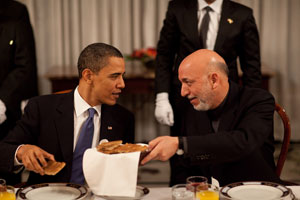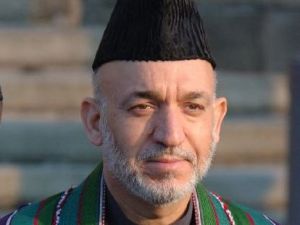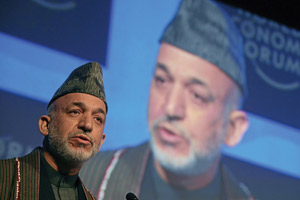
White House photo/<a href="http://www.flickr.com/photos/whitehouse/4471730708/">Pete Souza</a> (<a href="http://www.usa.gov/copyright.shtml">Government Work</a>).
Afghan President Hamid Karzai made it out of Washington last week alive—that is, without having to answer in public the allegations that his government is profoundly corrupt and fundamentally inept. Nor did he have to explain the bizarre remarks he made earlier this spring, when he claimed that the extensive fraud in last year’s presidential race was engineered by foreigners and when he threatened to join the Taliban. At the same time, it appears that the Obama White House orchestrated a successful pivot, patching up—or papering over—the tensions between the US administration and the Karzai government and finally settling on a communications strategy for talking about its relationship with Karzai. It was a week in which both sides escaped the dilemmas of the Afghanistan war.
Following Obama and Karzai’s Oval Office tete-a-tete on Wednesday, the two leaders held what the White House calls a “press availability.” In the East Room of the White House, they spoke before the White House press corps and a handful of Afghan reporters, but they only took four questions—two from American journalists, two from the Afghan media. Karzai could have been pressed about graft and incompetence—or about the serious problems his country has had building up its own security forces, which is the cornerstone of US policy in Afghanistan. But Mark Knoller of CBS News asked if the two leaders had been able to “put aside the tensions and frictions” that had erupted after Karzai’s curious comments. Both men essentially said, sure. CNN’s Suzanne Malveaux asked if the United States was on track to start withdrawing troops from Afghanistan in July 2011. Both presidents predictably replied with upbeat talking points. Karzai was not forced to contend with a single uncomfortable query.
The next day, during a public discussion at the US Institute of Peace, Karzai, accompanied by Secretary of State Hillary Clinton, again was not placed on the griddle. Most of the questions from the moderator, former Ambassador William Taylor, were policy-oriented and easy to field. (“What are your priorities? What specific steps will you take when you go back to Kabul?”) At the end, an audience member asked if Obama or any other administration official had asked Karzai to “sideline or fire” his brother, Ahmed Wali Karzai, who rules Kandahar, the strategically important city, where the next major operation of the war is expected to occur. (In April, New Yorker contributor Steve Coll wrote that Ahmed Wali Karzai “is the most visible, most intractable symbol of the corruption and the corporate self-interest of the Karzai government in southern Afghanistan.”) Karzai replied that he had mentioned his brother to Obama, that he would not disclose any details, that he cannot fire his brother, and that the “issue is resolved as it stands now.” Clinton didn’t say anything. Anyone concerned with transparency and corruption (which could be the fatal flaw in the Obama administration’s policy of building up the Afghanistan government and military) would not be encouraged by these responses.
Last October, White House press secretary Robert Gibbs declared that the administration could only succeed in Afghanistan if it had “a willing partner…that is free of corruption and transparent.” That set a high bar—which obviously has not been met since then. And there were meetings this past week between Afghan ministers and their US administration counterparts, during which anti-corruption and governance matters were discussed. (The Obama administration, according to an adviser to the Afghan delegation, is seeking to work directly with Afghan ministers it considers honest and competent and, in a gentle way, nudge Karzai away from certain government functions.) But the pervasive corruption and previous electoral fraud—which undermines the legitimacy of the Karzai government and fuels popular resentment toward Kabul and the war effort—were never fully addressed in public while Karzai was in town. During the press availability, Obama claimed that anti-corruption efforts in Afghanistan have been strengthened, but he offered no specifics. Obama said nothing so bold as demanding that Karzai’s government be “free of corruption and transparent.”
The administration also gingerly—and perhaps deftly—navigated other Karzai-related shoals. Five weeks ago, Gibbs, at a press briefing, pointedly declined to call Karzai an “ally” or “credible partner.” He would only refer to him as “the democratically elected leader of Afghanistan” (an arguable proposition). But during Karzai’s DC trip, the president and administration officials repeatedly hailed the US-Afghanistan “partnership.” They generally did not refer to Karzai as a partner, but they used the p-word to describe the overall relationship between the two nations. This seemed a deliberate effort to keep from fully embracing Karzai personally—without dissing him.
It was a fine line to walk. At a White House briefing last week, US ambassador to Afghanistan Karl Eikenberry, whose skepticism regarding Karzai has been widely reported, was asked if the Afghan president is “an adequate strategic partner.” He didn’t say yes. Instead, he replied, “President Obama has expressed his confidence in President Karzai and our work together.” Pressed on whether his previous concerns about Karzai have been addressed, Eikenberry said,
President Karzai is the—he’s the elected president of Afghanistan. Afghanistan is a close friend and ally, and of course I highly respect President Karzai in that capacity.
As he spoke those words, Eikenberry didn’t look too comfortable.The reporter pushed further: “So your concerns have not been allayed?” Gibbs intervened: “I think he answered it.”
He hadn’t, of course. And a lot of critical questions about Karzai and the $100 billion-a-year war had gone unanswered (and unasked) throughout the week. Which made the visit a success for Karzai and his partners in the White House.
















